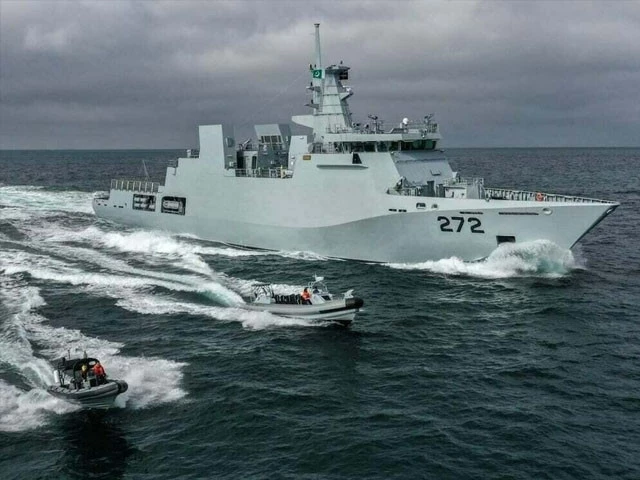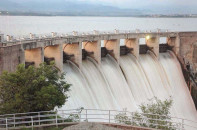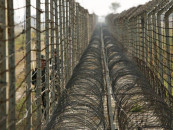Pakistan Navy’s effective strategy kept INS Vikrant confined to India’s territorial waters
Indian Navy could not advance any of its warships towards Pakistan due to strict surveillance of Pakistan Navy.

The Indian Navy’s aircraft carrier INS Vikrant was prevented from any maritime adventurism against Pakistan in the North Arabian Sea due to the well-coordinated strategy of the Pakistan Navy during the recent hostilities between the two nuclear-armed neighbours, officials with the Pakistan Navy told The Express Tribune.
The Pakistani military launched a massive operation codenamed 'Bunyanum Marsoos' (Formidable Wall) in response to the Indian aggression, targeting their airbases, airfields, weapon depots, missile stockpiles, brigade headquarters, etc.
Like the other two services, the Pakistan Navy also played a key role in this swift operation. The Indian Navy remained confined to its own territorial waters and did not dare to challenge the Pakistan Navy in the south, according to the officials.
Throughout the entire period of tension, the Indian Navy could not advance any of its warships or aircraft towards Pakistan due to the strict surveillance and constant presence of the Pakistan Navy, one official added. “As a result of this strong strategic posture, the Indian aircraft carrier INS Vikrant posed no threat to Pakistan and avoided any kind of maritime operation.”
The Pakistan Navy's presence in the south and its comprehensive strategy allowed the armed forces in the north and northeast to achieve their objectives, the official added. “Not only did the Pakistan Navy restrict the Indian Navy to its own waters, but it also ensured the safety of Pakistan’s maritime trade routes and coastal regions.”
The Indian Navy admitted that it didn’t participate in the “Operation Sindoor” which their military had launched. Director General of Naval Operations Vice Admiral AN Pramod said that the Indian Navy was prepared but kept waiting for the instructions from the government.
However, a Pakistan Navy official said that the uninterrupted operation of Pakistan’s three ports — Karachi Port, Port Qasim, and Gwadar Port — throughout the hostilities stands as clear evidence of our effective strategy.
“The Indian Navy faced humiliation as it had been confined to its territorial waters by a much smaller adversary throughout the tension,” he added. “The credit goes to the leadership, officers, and sailors of the Pakistan Navy who successfully safeguarded Pakistan’s maritime frontiers and denied the enemy any opportunity for aggression.”
Pakistan-India ceasefire
Pakistan and India agreed to a full and immediate ceasefire on Saturday following days of intense military exchanges that raised fears of a full-scale conflict between the two nuclear-armed neighbours.
The announcement was first made by US President Donald Trump and later confirmed by Pakistan’s Prime Minister Shehbaz Sharif, Deputy Prime Minister Ishaq Dar, Indian External Affairs Minister S Jaishankar, and US Secretary of State Marco Rubio. The ceasefire came after missile strikes, drone incursions, and retaliatory operations across the border.
Tensions flared after a deadly April 22 attack in Pahalgam, Indian Illegally Occupied Jammu and Kashmir (IIOJK), that left 26 civilians dead. India blamed Pakistan-based elements without providing evidence; Islamabad strongly rejected the claim.
India responded by closing the Wagah border, revoking Pakistani visas, and suspending the Indus Waters Treaty—moves Pakistan labelled as an “act of war.”
By May 6–7, Pakistan launched Operation Bunyanum Marsoos, downing five Indian jets, including Rafales, and intercepted 77 Israeli-origin Harop drones.
The US played a central role in facilitating backchannel diplomacy. Secretary Rubio and Vice President JD Vance held talks with senior leaders from both countries, including PMs Shehbaz Sharif and Narendra Modi, as well as top defence and intelligence officials.
Following Trump’s announcement, both countries suspended military activity across land, air, and sea, though allegations of ceasefire breach were also reported from both sides of the Line of Control.


























COMMENTS
Comments are moderated and generally will be posted if they are on-topic and not abusive.
For more information, please see our Comments FAQ